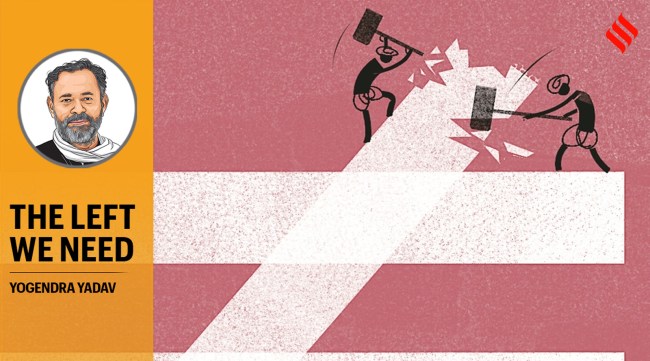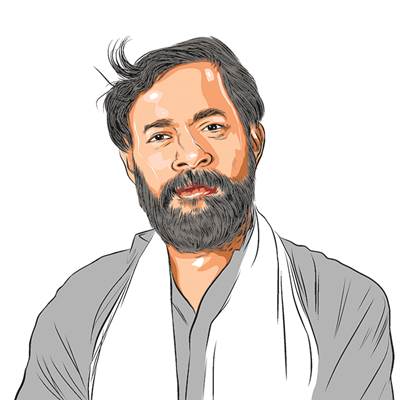Opinion The legacy of Indian socialism can’t be allowed to fade away. It’s the Left we need
Its ideas are critical for us today. It’s time to recall, repurpose and renew its political and ideological resources.
 Contrary to popular impressions, Indian socialism was not an Indian version of the social democratic tradition in Europe that sought modest reduction in inequalities through electoral democratic means. (Illustration by C R Sasikumar)
Contrary to popular impressions, Indian socialism was not an Indian version of the social democratic tradition in Europe that sought modest reduction in inequalities through electoral democratic means. (Illustration by C R Sasikumar) “I am glad we have a young chair for this session,” announced Suniti tai, as she introduced the panel for the penultimate session of the Samajwadi Ekjutata Sammelan, a convention that brought hundreds of activists from across the country to Pune to mark 90 years of the socialist movement in India. “But I am 55, hardly young,” demurred Avinash Patil, the proposed chair. “For socialists, anyone under 60 is young. For Gandhians, the bar is 75,” I quipped.
Like most jokes, this one covered a painful truth. The legacy of Indian socialism is fading away, unsung, just when we need it the most. The political stream that took on the politics of hatred in the Hindi heartland has shrunk to the margins. The fountain of ideas to counter the dominant fake nationalism is not accessible to the young voices of resistance. It’s not just a tragedy for the dwindling tribe of nostalgic socialists. It is a national loss.
There is a general amnesia about this strand of our national life. Ask a young person about Indian socialists. You would draw a blank. The distinction between a socialist, a communist and an underground Maoist is all a blur. To them, these are all “leftists”, relics of the past, if not a dreadful challenge to the future of new India. Ask a young mediaperson. You might hear about Mulayam Singh Yadav, one of the last mass socialist leaders, not quite a model of socialist politics. Older journalists would recall the flamboyant yet conflicted George Fernandes and the earthy yet eccentric Raj Narain, but they may not have vivid memories of Karpoori Thakur, Madhu Limaye, S M Joshi, Rabi Ray, Mrinal Gore and Kishen Pattanayak, not to mention the earlier generation of Yusuf Meherally, that charming mayor of Mumbai, or Achyut Patwardhan, the spiritual socialist.
If not amnesia, there is disjunction. “Loknayak” Jayaprakash Narayan, or JP, is remembered as a Gandhian Sarvodaya leader who mentored the Janata Party. “Hathkargha maa” Kamaladevi Chattopadhyay is a legend for her work on Indian handicrafts and culture. “Acharya” Narendra Deva is revered as a sagely scholar and Sane “Guruji” as an iconic Marathi writer. Among Adivasis, “Mama” Baleshwar Dayal is remembered as a social reformer. And thanks to the OTT film Ae Watan Mere Watan, Usha Mehta is now known as a brave freedom fighter. But none of them is remembered as a leader of the socialist movement. Ram Manohar Lohia is referred to as a socialist, but is remembered more as a forefather of Mandal, and less as an original socialist thinker and leader.
A photographic exhibition at this convention in Pune served to reclaim this galaxy of leadership for the Indian socialist movement, a distinct political and unique ideological strand in the 20th century. It began in 1934 with the founding of the Congress Socialist Party, which sought to radicalise the anti-colonial struggle by connecting political freedom with social and economic equality. Though most of the leaders, including JP, were initially Marxist in their ideological orientation, they chose to work inside the Indian National Congress, unlike the communists. Their high point was the Quit India movement when JP, Lohia and socialist workers like Mehta played a heroic role in the underground resistance. Post-Independence, the socialists left the Congress party and created a left democratic opposition, distinct from, and often in opposition to, the Communist Party of India. Despite a string of sub-par electoral performances in the heydays of Congress dominance, the socialists served as a vehicle for political mobilisation of backward castes and the poor, mainly in the Hindi belt. Along with the communists, the socialists can be credited for the deepening of Indian democracy in its formative years.
The presence of several socialists who resisted the Emergency served to recall another glorious chapter in the history of the Indian socialist movement. Many of them had spent 19 months of the Emergency in jail: Rajkumar Jain, once a firebrand student leader and later a professor, activist-thinker Vijay Pratap and trade unionist “Comrade” Dalip Singh. Professor Anand Kumar, now an eminent public intellectual, who had organised an anti-Emergency campaign in the US, was also present in the Sammelan. Yet none of them allowed their bitter history with the Congress to cloud their judgement of the Narendra Modi regime. If anything, a consistent history of resisting authoritarianism placed these socialists in a unique position to offer principled opposition to the current onslaught on our democratic republic.
The many bookstalls at this gathering drew attention to the rich ideological legacy of Indian socialism, which has suffered criminal neglect in our world of ideas. Unlike the communist left, the socialist left in India never developed a robust academic subculture and were kept away from the world of English speaking opinion-makers. No wonder the pathbreaking theoretical contribution of Indian socialists remains largely unacknowledged. The re-launching of the two-volume collection of the documents of the socialist movement (Samajwadi Andolan ke Dastavej, eds. Vinod Prasad Singh and Sunilam) in this convention served to make these ideas accessible to the new generation.
Contrary to popular impressions, Indian socialism was not an Indian version of the social democratic tradition of Europe that sought modest reduction in inequalities through electoral democratic means. Indian socialism, best articulated by Lohia, was a distinct doctrine that abjured its eurocentric origins and recast the idea of socialism for the entire world.
Four of these ideas are critical for us today. First, Indian socialism expanded the notion of equality beyond the economic dimension to include aspects such as caste, gender, race and nationality, which are relevant to the renewed global concern about rising inequality. This can also help us address graded and intersectional inequalities involved in debates like women’s reservation, caste census or subquotas within OBC or SC quotas. Second, Indian socialists laid the foundations for rethinking the urban-industrial technocratic model of development in favour of sustainable well-being, which is the need of the hour in the face of climate change. Third, Indian socialists drew upon Gandhi’s satyagraha as an alternative to purely electoral change or political violence as a means to social transformation. Finally, the Indian socialists evolved a new grammar of cultural politics deeply rooted in our languages, cultural symbols and nationalism, a resource that we desperately need in the face of the current onslaught in the name of cultural nationalism and the global rise of populism and ethnic nationalism.
A few decades ago, you could not think of the future without the prism of socialism, in one version or another. Today, the pendulum has swung to the other end. Socialism has become a cuss word. Yet the aspiration for a humane world, a world without obscene inequalities, a world that offers well-being to everyone, has not lost its innate appeal. This quest may choose a label other than socialism, overlooking the sectarian feuds that marked the history of this idea in the 20th century. It may find newer political vehicles, perhaps newer kinds of political formation. Yet the idea of socialism will continue to serve as a resource for the future, if only we know how to recall, renew and repurpose it.
I came back from Pune in the hope that marking 90 years of the socialist movement could offer us potent political and intellectual resources to take on the 100-year-old legacy of the RSS.
The writer is member, Swaraj India, and national convenor of Bharat Jodo Abhiyaan






